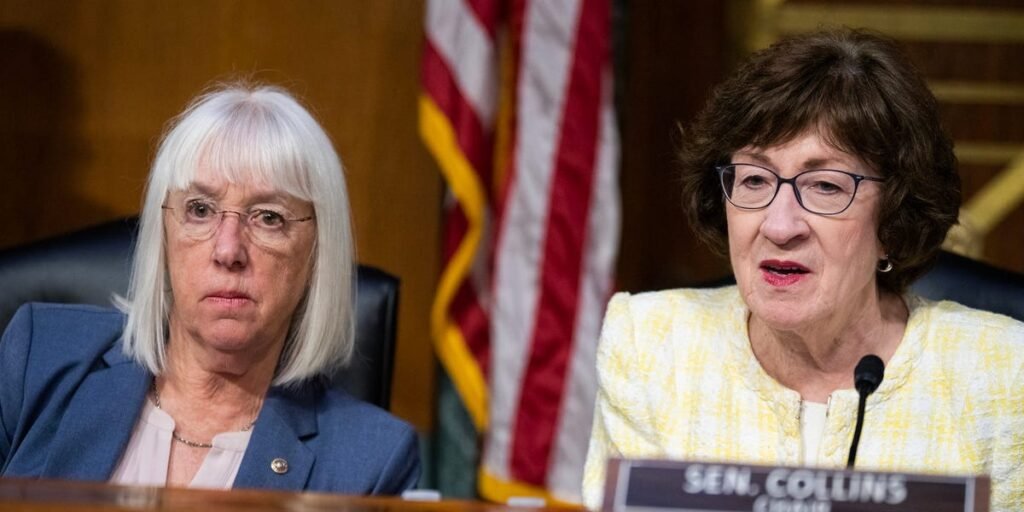With just over three weeks to go before a critical deadline, the push to codify DOGE cuts is hitting resistance on Capitol Hill.
Several GOP senators sound skeptical about the $9.4 billion in cuts to foreign aid and public broadcasting funding that the Trump administration is asking Congress to approve, raising the prospect of a high-profile setback for the DOGE project just weeks after Elon Musk and President Donald Trump’s public feud.
The House narrowly approved the cuts, in part identified by Musk and the White House DOGE Office, earlier this month.
The administration’s troubles were evident at a Senate Appropriations Committee hearing on Wednesday. Lawmakers in both parties highlighted the potential negative impacts of clawing back the funding as they heard testimony from Russell Vought, the director of the White House Office of Management and Budget.
“We have Native American radio stations in South Dakota. They get their funding through NPR, 90-some percent of what they use,” Republican Sen. Mike Rounds of South Dakota said at the hearing. “They will not continue to exist if we don’t find a way to take care of their needs.”
Republican Sen. Susan Collins of Maine, the committee chair, also raised concerns about the $1.1 billion in public broadcasting cuts. Another moderate Republican, Sen. Lisa Murkowski of Alaska, has previously said that she’s opposed to the cuts because rural Alaskan communities depend on the funding.
Several GOP lawmakers are also concerned about the $8.3 billion in foreign aid cuts. Sen. Mitch McConnell of Kentucky, the former Senate GOP leader, broadly criticized DOGE efforts to cut wasteful foreign aid spending during his remarks at the hearing.
“There’s plenty of absolute nonsense masquerading as American aid that shouldn’t receive another bit of taxpayer funding,” McConnell said. “But the administration’s attempt to root it out has been unnecessarily chaotic.”
Several of them have raised concerns in particular about cuts to PEPFAR, a global program to combat and treat HIV/AIDS, though the administration has insisted that life-saving programs will continue to receive funding.
‘My biggest concern is that the appropriations process work’
Democratic senators are expected to unanimously oppose the cuts, just as their counterparts did in the House.
Please help BI improve our Business, Tech, and Innovation coverage by sharing a bit about your role — it will help us tailor content that matters most to people like you.
What is your job title?
(1 of 2)
What products or services can you approve for purchase in your role?
(2 of 2)
this data to improve your site experience and for targeted advertising.
By continuing you agree that you accept the
Terms of Service
and
Privacy Policy
.
Thanks for sharing insights about your role.
With the Senate divided 53-47, that means Republicans can only afford to lose three votes.
The administration is using a process known as “rescission” to pursue the cuts, which allows the White House to ask Congress to claw back money it has already approved. The process has not been successfully used in over two decades, and the Senate rejected a rescission request in 2018, during Trump’s first term.
Lawmakers must approve the cuts within 45 days of the request — July 18 — or Trump is required by law to spend the money. The administration has said that this could be the first of several rescission requests.
Democrats have argued that the prospect of constant rescissions threatens to undermine the bipartisan government funding process, where both parties agree to provisions in funding bills that they may not support in order to get enough votes to clear the 60-vote filibuster threshold in the Senate.
Rescissions only require 51 votes in the Senate, raising the prospect that Republicans, led by the White House, could unilaterally strip out Democratic priorities after funding bills are passed.
At least one Republican senator appeared to be listening to those arguments on Thursday.
“My biggest concern is that the appropriations process work, and that Republicans and Democrats agree that the process will end up in a negotiated settlement,” Rounds said. “If we get to the point where the Democrats look at this and say, ‘We can put it in the bill, but they’re not going to fund it, or they’re not going to use it,’ then there’s no reason for them to work with us to get to 60 votes.”
Rounds said that he would “try to negotiate” with the administration about preserving public broadcasting funding, while Collins told reporters after the hearing that she wanted to see “fundamental changes” to the bill and was working on an amended version.
If the Senate passes an amended version of the bill, the House would have to pass the measure again before the July 18 deadline.
Read the full article here


